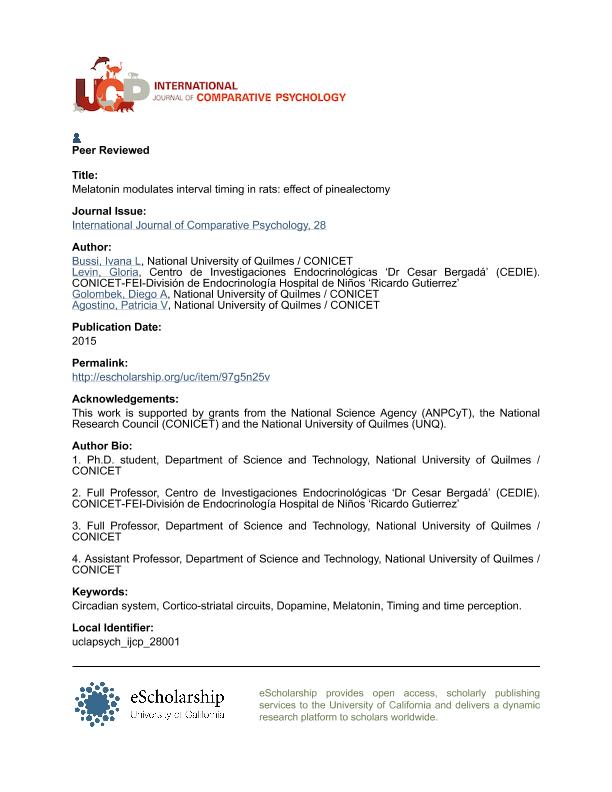Artículo
Melatonin modulates interval timing in rats: effect of pinealectomy
Fecha de publicación:
09/2015
Editorial:
eScholarship University of California
Revista:
International Journal of Comparative Psychology
ISSN:
0889-3667
e-ISSN:
2168-3344
Idioma:
Inglés
Tipo de recurso:
Artículo publicado
Clasificación temática:
Resumen
Interval timing is a complex cognitive process that involves the estimation of time within the seconds-to-minutes range. This temporal processing depends on cortico-striatal interactions, as well as an optimal dopaminergic function. On the other hand, the circadian system controls physiological and behavioral functions with periods close to 24 hr. We have previously reported that short-time perception in mice is influenced by the circadian pacemaker, with dopamine signaling as a link between both temporal systems. In this work we evaluated the involvement of melatonin in the circadian modulation of interval timing, as well as the interaction between this hormone and dopamine levels in the striatum. We report that melatonin-depleted rats, by pinealectomy, present an impairment in their ability to estimate a short (24 s) target duration in the peak-interval procedure. Moreover, melatonin administration in drinking water restores interval timing precision in pinealectomized rats. We also show that circadian desynchronization causes a transient impairment in the timing task. In addition, melatonin administration affects interval timing only when rats are trained and tested during the night. Furthermore, we report that melatonin depletion increases striatal dopamine availability, which is reverted by external melatonin administration. Taken together, our findings add further support to the notion that the circadian system modulates interval timing, probably by using melatonin as an output to regulate dopaminergic functions in brain areas that are important for interval timing mechanisms.
Palabras clave:
Interval Timing
,
Circadian Rhythms
,
Melatonin
,
Dopamine
Archivos asociados
Licencia
Identificadores
Colecciones
Articulos(SEDE CENTRAL)
Articulos de SEDE CENTRAL
Articulos de SEDE CENTRAL
Citación
Bussi, Ivana Leda; Levin, Gloria Mabel; Golombek, Diego Andrés; Agostino, Patricia; Melatonin modulates interval timing in rats: effect of pinealectomy; eScholarship University of California; International Journal of Comparative Psychology; 28; 9-2015; 1-17
Compartir




